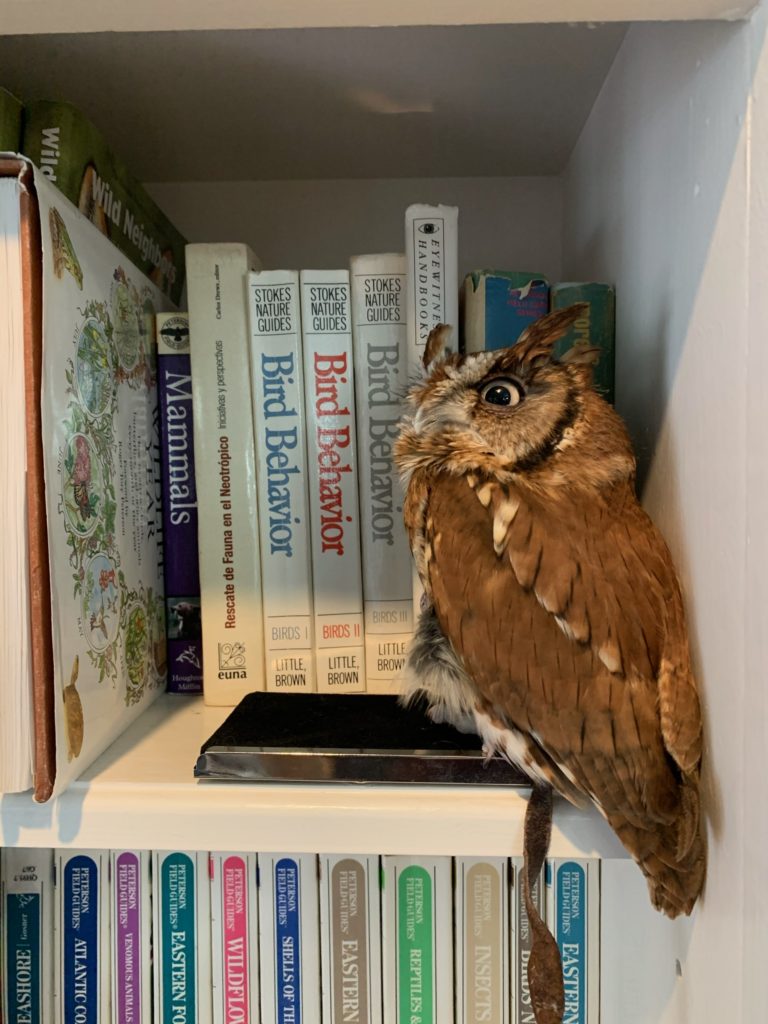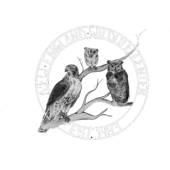
Cape Wildlife Center is delighted to announce that we now have our first ambassador animal. Loki, a red morph Eastern Screech Owl arrived at our hospital this summer in June. He was brought to us by Wareham Department of Natural Resources ,injured, possibly hit by a car. Loki was about 3 weeks old and a small ball of fluffy, downy feathers. He was missing one eye, his beak was misaligned, and he couldn’t fly. Because of these extensive injuries we knew immediately that he would not be able to care for himself in the wild. Because of his young age, he was the perfect candidate to be trained to be our first ambassador animal.
All ambassador or educational animals have to be permitted by the Massachusetts Department of Fish and Wildlife. Even though we are a licensed wildlife hospital, we had to apply for this special educational permit. Educational animals need to make 12 appearances a year in the community to promote wildlife education. Loki will be working in schools and at wildlife events with a trained handler. Loki is the only animal at Cape Wildlife Center that is being socialized by staff and the goal is that he will be comfortable around people and new situations. All our other animals are purposely kept as wild as possible to give them the best chance of survival once released.
Loki received treatment for the wound where his eye was and eye drops for his existing eye. His beak is regularly trimmed so he can eat without problems. Over the past four months he has healed his injuries and has grown in most of his adult feathers. He enjoys his mice and his mealworm treats. He lives at the center and is handled everyday by multiple staff to increase his comfort level around people. He is a great success story of an animal that not only got a second chance to live, but also is going to spread an important message about human-wildlife interaction.
Loki’s physical presence will teach the public about wildlife on Cape Cod in general, and about Screech Owls specifically. The Eastern Screech Owl is the second smallest owl in Massachusetts. They can be found in any habitat with tree cover although tree cavities or nest boxes are essential for them to breed. They nest in tree holes enlarged by other animals and will accept nest boxes. They never build a nest. The female lays her eggs on top of whatever debris is in the bottom of the nesting cavity. They lay 2-6 eggs once a year. They eat most small animals including birds, mammals insects, frogs and lizards. When prey is plentiful, they will cache extra food in tree cavities. Screech Owls are mostly active at night (nocturnal), although they will hunt at dawn or dusk and even during the day. They generally wait in the trees for prey and then swoop down to snag it. They often hunt insects they see in the headlights of cars and many times get hit by the vehicle. We see a lot of those injuries, but in general many survive successfully.
Loki can live upwards of 15-20 years in captivity. He is at the beginning of his journey with us. One thing we have left to do is to find out Loki’s sex. We refer to Loki as he but until we get a blood test we do not know for sure. We will be having a gender reveal on November 13th. We are all extremely excited to welcome Loki as our first ambassador animal, and hope to have non-releasable animals from other species join him in the future.
To learn more about the Cape Wildlife Center or help in their mission, visit www.capewildlifecenter.com or call 508 362-0111. Stop in to visit our gift shop open 7 days a week 9-4.
Caryn Ritchie is the volunteer coordinator for the Cape Wildlife Center and holds both a Massachusetts rehabilitator’s license and a federal permit to rehabilitate migratory birds.

Recent Comments